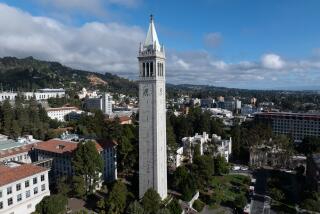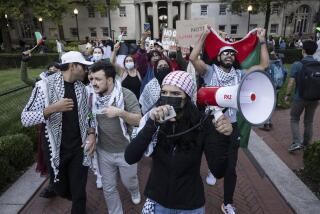Assembling Pieces of the Islam Puzzle
- Share via
BELCHERTOWN, Mass. — After working long hours at the hospital, the office, the schoolroom or the garage, the 36 men and women who gathered at Clapp Memorial Library could easily have thought of less demanding ways to spend a Monday evening.
Instead, these residents of an old farming community in the center of the state sat and listened to a University of Massachusetts professor discuss the nuances and complexities of the Middle East. For two hours, no one got up and left, no one used a cellphone and nearly everyone took copious notes.
David Mednicoff’s lecture -- the second in an unusual effort to educate the general public -- focused on Western colonialism in the Middle East, the growth of authoritarianism and recent challenges to state authority in the region.
He examined the contours of U.S. policy in the Middle East, and addressed an implication of that strategy: how Americans are perceived in the Middle East as a result of their government’s actions.
Many in the audience said they came to the class because U.S. policy in the Middle East would influence their vote in Tuesday’s presidential election.
“This is terribly important to me as a citizen,” said Colleen Durocher, a nurse who had such a headache when she got off work Monday that her first inclination was to go home and pull the sheets up over her head. But she went to the class, reasoning: “There is so much to learn. I know a lot about the Judeo-Christian tradition. But until this class, I knew nothing about Muslims -- nothing about that part of the world.”
Durocher, 46, said the urgency of world events had fueled her curiosity: “9/11 made me come to grips with my own ignorance. I realized I needed to use that ignorance as a motivation toward knowledge and education.”
Indeed, the class called “Contemporary Middle Eastern Politics and the U.S.” evolved from the terrorist attacks of three years ago. David Tebaldi, head of the Massachusetts Foundation for the Humanities, said that days after the disaster, librarians began calling his organization to say their patrons wanted to learn about Islam and the Middle East.
“They asked if we had any programs we could offer about the region and the religion,” Tebaldi said. “The answer was no, but we knew it should be yes.”
Universities taught classes about the Middle East, and churches, synagogues and mosques occasionally presented one-shot lectures. But when Tebaldi found little in the way of ongoing education for adults who wanted to learn about the region, the foundation launched a four-session course called “Understanding Islam.”
With a curriculum developed by a Harvard historian, the free program at 12 Massachusetts public libraries was soon oversubscribed. “We have been doing courses like this for 20 years, and we have never had a response like that,” Tebaldi said.
The enthusiastic public reaction sold the agency on a sequel about the modern Middle East. A group of scholars prepared a curriculum, using as a text a book -- “Between Memory and Desire” -- by UC Santa Barbara professor R. Stephen Humphreys. The demand was immediately apparent when 100 people packed the first lecture on Middle Eastern culture this fall at the library in Pittsfield, an impoverished industrial city in western Massachusetts.
Belchertown librarian Owen Maloney said when he offered an evening seminar, he generally was lucky if 10 people turned up. But in a town where 60% of the 13,000 residents have at least a bachelor’s degree, Maloney said, he was not surprised when every seat was taken in the first session of the new course.
“You’d have to live in a cocoon not to realize that the Middle East is a trouble spot that affects us in our daily living,” he said, explaining that library volunteers held a book sale to raise the $510 the foundation charges each site.
Maloney said Belchertown, two hours west of Boston and a 20-minute drive from five colleges in the state’s Pioneer Valley, is typical of the communities across Massachusetts that have sponsored the Middle Eastern culture class.
“The people who are at these programs, they have worked all day,” Maloney said. “They have taken care of children, they have driven buses, they have worked in offices, they have taught school. It is impressive to see the kind of participation that we have had.”
Joanne Newman, 52, the development director for nearby Holyoke Medical Center, said her husband, a chemical engineer, conducted business in the Middle East. Newman is also of Lebanese descent.
But she said her main motivation for taking the class was that “my son is over there, guarding an ammunition pile that used to belong to Saddam Hussein.” She said she wanted some foundation for understanding the area where her son Rich, 26, is stationed with the Marines.
In some ways, Newman said, “the things I have learned are like little bits and pieces of a puzzle we are all trying to figure out.”
At his lectern in the library here, Mednicoff acknowledged: “Some of what we have done in the Middle East, and some of what we are still doing there -- it is hard to make sense of this. We want to believe as Americans that what we have done is good, or right, and that our foreign policy makes sense. But why would people there be so hateful that they would be able to raise money and attract recruits willing to kill American citizens, and themselves?”
Mednicoff said the legacy of Western colonialism hovered powerfully over contemporary Middle Eastern culture. Borders created in the 20th century by outsiders “were not necessarily logical, or in sync with the region,” he said. Along with “a map that is pretty random,” the area was left with a sense “that Westerners came in, took away more than they gave in economic terms -- and cannot really be trusted in some of the promises they made.”
With degrees from Princeton and Harvard, Mednicoff, 44, has traveled and taught extensively in the Middle East. In exchange for a stipend that only slightly exceeds his travel costs, he eagerly signed up to teach the library-based lecture series.
“What I have seen,” he said, “is a real thirst for some sense of intellectual security on this issue -- not just that you can go to New York and feel safe, but security in that you can come up with your own worldview about what is happening.”
Climbing into her car to head home after the lecture, Madeline Casey, 80, said her family could not afford to send her to college, and for most of her life she worked as a secretary.
“I’ll tell you, I never learned anything about the Middle East in school,” she said. “It’s like, until now, the Middle East really didn’t exist -- they weren’t there, they weren’t important, and we really didn’t know about them.
“I think this course should be in every library in the country,” Casey said. “And I hope it will.”
More to Read
Sign up for Essential California
The most important California stories and recommendations in your inbox every morning.
You may occasionally receive promotional content from the Los Angeles Times.













